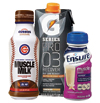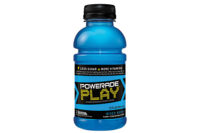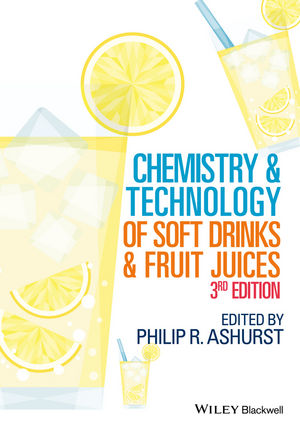
The appeal of protein beverages continues to expand beyond the traditional market of bodybuilders. With the help of the ready-to-drink (RTD) segment of protein drinks, manufacturers are able to address the consumers who are looking for basic nutrients, such as protein and fiber, when it comes to weight loss and weight management, says Eric Hart, senior brand development manager with Bio-Engineered Supplements & Nutrition Inc. (BSN), Boca Raton, Fla.
Addressing weight management is a market that Zenith International highlighted in its “Global RTD Protein Beverages” report released in 2009. The report summary states that a whole industry within food and beverage has developed that appeals to this audience.
“Protein has been found to affect satiety, meaning that it gives the individual the feeling of being full for longer and hence should reduce cravings,” Zenith’s report states. “There are now protein beverages on the market appealing exclusively to this market.”
The functional drink category, which includes sports nutrition drinks, has been a market that has transformed from the niche of serious exercisers to include anyone who exercises or is interested in leading a healthy lifestyle, Zenith’s report says.
“The market for the more established powder supplements and water-based sports drinks has been augmented through a great deal of research to include products either based around, or at least containing, a significant quantity of protein,” the report states.
“… As such, they have the potential to go from specialized, marginalized products that appeal only to a very small percentage of the population to a mass appeal, mass marketed product. This transformation is still very much in its infancy but the process is developing rapidly as more companies wake up to the potential of protein beverages.”
Protein drink manufacturers also are finding ways to address the calories in RTD products.
EB Performance, Boca Raton, Fla., makers of Whey Juice, rebranded Whey Juice Skinny as Whey Juice Lean last year. Each 16.9-ounce bottle contains the same 15 grams of protein, but is 120 calories compared to the 210 calories in Whey Juice. Whey Juice Lean is sweetened with stevia leaf extract and is available in Strawberry-Blueberry-Banana, Orange-Peach-Mango and Cranberry-Apple-Acai.
Expanding flavors, distribution
The weight management community isn’t the only way that RTD protein beverages have increased their appeal.
“The convenience is increased even more with the added portability and consistency of serving sizes and flavors,” BSN’s Hart says. “It makes for a very useful on-the-go meal replacement or even just a healthy alternative when snack cravings hit.”
As part of its Syntha-6 product line, BSN offers RTD protein shakes that contain 28 grams of protein in each 14-ounce bottle. The company also has its RTD core series, which contains 40 grams of protein in a 16.9-ounce Tetra Pak carton.
Hart says that in 2010, retail sales for BSN’s RTD protein beverage segment tripled when compared to 2009 sales in the same segment.
Early forms of RTD protein drinks were developed as a complement to the larger powdered market, Zenith’s report states. The study found that producers blend proteins to give consumers the advantages it offers, while making sure the product looks and tastes good.
BSN sees that the taste aspect of a protein drink is an area that consumers are concerned about.
“We feel the primary concern for consumers of protein drinks is taste - plain and simple,” Hart says. “As long as your product has a good amount of protein and keeps the fat content in check, it really just comes down to whether people enjoy drinking it or not. If you have to choke it down, only the most dedicated fitness types will buy it. But if it genuinely tastes good, people will find it much easier to put down the candy bars and reach for a protein drink.”
VPX, Weston, Fla., offers a product line that features a wide range of flavor offerings. Its Protein Rush Shake is available in Strawberry Shake, Vanilla Dream, Chocolate Dream, Banana Supreme and Cookies & Cream. The shakes are packaged in 17-ounce aseptic cartons and contain 1 gram of sugar and 40 grams of protein, which is 80 percent of the daily recommended value.
ABB Performance Beverages, owned and operated by Optimum Nutrition, Aurora, Ill., offers its RTD protein drink Pure Pro and Pure Pro 50 shakes. Pure Pro 50 contains 50 grams of protein and is packaged in a resealable 14.5-ounce aluminum bottle. Its Pure Pro shakes are available in 12-ounce resealable aluminum bottles and contain 35 grams of protein.
“Demand for our Pure Pro and Pure Pro 50 protein shakes remains steady, and as more performance-minded consumers discover the muscle building benefits of amino acids, the market continues to expand beyond gyms and health food retailers,” says Tim Weigard, communications coordinator for ABB. “We see tremendous opportunity as we continue to engage a new generation of physically active consumers.”
BSN also noticed increased demand throughout the convenience sector and that has created a demand among the national retailers in the food, drug and mass market channels, Hart says. The company is seeking more channels to promote and deliver its protein products.
“The company’s affiliation with the Ultimate Fighting Championship, for example, has provided an excellent platform to increase awareness of the brand,” he says. “With Syntha-6 carrying the designation as the Official Protein Beverage of the UFC … consumers from this demographic are now recognizing and requesting the Syntha-6 brand in many retail outlets. This demand is being further supported with key distribution agreements throughout key markets across the country.”
Protein drink manufacturers also are using packaging to market to niche groups. CytoSport, Benicia, Calif., released limited-edition packaging for its Muscle Milk protein-enhanced functional beverage. The company distributed a limited-edition 14-ounce bottle featuring the Chicago Cubs logo and marquee. Bottles were sold during the 2010 summer in the Chicago area. In the fall, Muscle Milk released eight limited-edition, collegiate-themed bottles. The program included Georgia Tech, University of Miami, The Ohio State University, University of Colorado, Arizona State University, University of California-Berkeley, University of Southern California and University of California-Los Angeles. The limited-edition 14-ounce Muscle Milk College themed bottles were branded with school logos and were available at retail outlets in and around campuses.
Emerging markets
The protein drink market in addition to seeing new products, marketing strategies and distribution expansion also saw other companies address consumers’ interest in protein-enhanced beverages. A division of PepsiCo, The Gatorade Co., Chicago, relaunched its sports drink portfolio with the debut of G Series, a three-tiered product line with Prime 01, Perform 02 and Recover 03, a protein-enhanced sports beverage.
Recover 03 is designed as a post-exercise recovery drink that quenches thirst and provides muscle recovery benefits, the company says. The product contains 16 grams of protein and is available in a 16.9-ounce bottle in Strawberry-Kiwi, Lemon-Lime-Orange and Mixed Berry varieties.
Gatorade also launched its G Series Pro, which was developed for needs during and after training and competing at the level of professional athletes, the company says. G Series Pro also is set up in a three-tiered product line, including Recover 03. G Series Pro Recover 03 Protein Recovery Shake is designed to facilitate muscle rebuilding with fast-acting whey and slow-acting casein from milk protein in each serving, the company says. The 16.9-ounce Tetra Pak carton contains about two servings and each serving contains 15 grams of protein.
Last year, Bolthouse Farms, Bakersfield, Calif., which offers its Perfectly Protein tea, lattes and cappuccino, launched its Protein Plus Chocolate and Protein Plus Mango varieties. The Mango variety is made with 90 percent juice from mango, carrots, apples, orange and banana and contains soy and whey protein. The product is available in a 15.2-ounce bottle that contains 30 grams of protein and the multi-serving 32-ounce bottle with 64 grams of protein.
Although protein drinks appeal to exercise enthusiasts and market analysis sees potential for the casual exerciser and dieter, protein beverages also could appeal to the aging consumer population, according to Fonterra Co-operative Group Limited, Auckland, New Zealand.
Fonterra, which exports dairy products and ingredients, notes that dairy proteins have increased in demand due to health and nutrition benefits associated with them, as well as an increased consumer understanding and acceptance.
“Highly functional protein ingredients are well-placed to not only deliver on the promise to consumers but will allow manufacturers to responsibly market the benefits,” Fonterra says. “The emergence of functional foods and beverages specifically targeting the baby boomer generation is likely to be a key area of innovation.”
Zenith International’s report says that protein can be used alleviate problems of sarcopenia or other physical effects caused by aging. It says that whey drinks have a neutral taste and are easy to digest, which could target this group as well as hospital patients.
Abbott, Abbott Park, Ill., launched its Ensure Muscle Health shake last year. The product contains 13 grams of protein to help rebuild muscle and strength naturally lost over time, the company says. Ensure Muscle Health is packaged in an 8-ounce resealable bottle and is available in Milk Chocolate, Vanilla, Strawberries & Cream and Banana Cream varieties. BI




